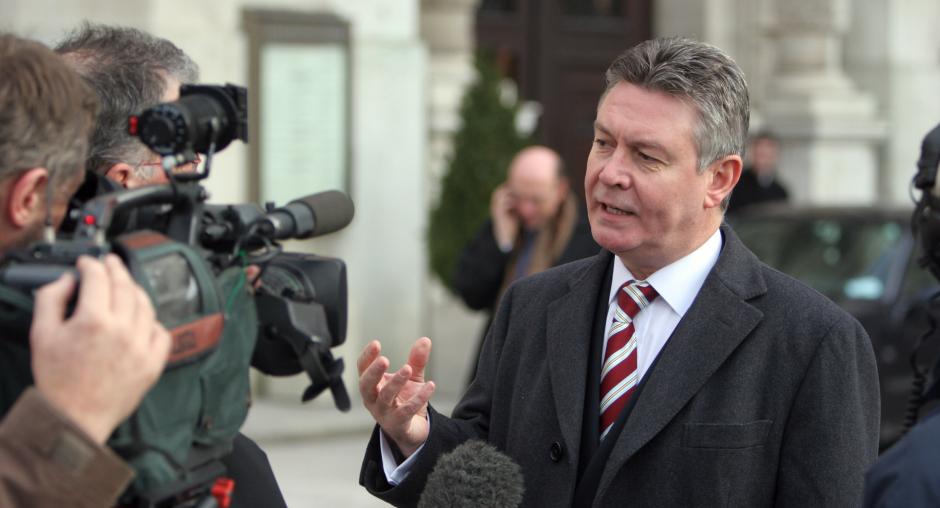Newsroom
Chairman says all sides in southern Caucasus showing will for solution of Nagorno-Karabakh conflict
MOSCOW 26 January 2006

OSCE Chairman-in-Office, Belgian Foreign Minister Karel De Gucht, speaking to the press. (OSCE/Mikhail Evstafiev) Photo details
MOSCOW, 26 January 2006 - Concluding his first visit to the southern Caucasus, the OSCE Chairman-in-Office, Belgian Foreign Minister Karel De Gucht, held discussions in Baku with Azerbaijan President Ilham Aliyev, Foreign Minister Elmar Mammadyarov and the representative of the Azeri community of Nagorno-Karabakh, Nizami Bahmanov.
Immediately afterwards, the Chairman-in-Office flew on to Moscow to hold discussions with the Foreign Minister of Russia, which is one of the three co-chairs (along with France and the United States) of the Minsk Group. This OSCE body is mediating in the Nagorno-Karabakh conflict, the main issue dividing Azerbaijan from its neighbour Armenia.
At a press conference in Baku, Minister De Gucht said he had detected some willingness on the part of both Azerbaijan and Armenia to push for a solution. Even though there were different positions on the territorial aspect, he remained cautiously optimistic about the outcome of the forthcoming meeting between the two Presidents in Paris.
"There are still many stumbling blocks, but with constitutional reform in Armenia and elections in Azerbaijan now behind us, there is a clear window of opportunity open this year. The benefits to both sides would be enormous, in terms of renewing economic development and improving the lives of the many people living in the contested regions.
"If some form of agreement on basic principles is reached in two weeks, the OSCE can make a major contribution in terms of putting this into practice. The Belgian Chairmanship, in co-operation with the Co-Chairmen of the Minsk Group, will do everything possible to help bring about a lasting solution. The entire Organization is ready to assist with implementation, including establising a peacekeeping force and facilitating economic and environmental agreements, if a request is made by the parties."
At his meeting with Azerbaijan's President Aliyev, the Chairman-in-Office emphasized that a political dialogue remained the only acceptable way to resolve the dispute and that any other solution was not compatible with OSCE values and commitments.
Earlier, in a discussion with the representative of the Azeri community of Nagorno-Karabakh, Nizami Bahmanov, Minister De Gucht said it was clear that a solution for the fate of the displaced populations would have to form part of the overall settlement.
Returning via Moscow, the Chairman-in-Office held a meeting with Foreign Minister Sergey Lavrov to brief him on the details of his fact-finding visit to the southern Caucasus. Together they also discussed Russian proposals for the reform of the OSCE, which is one of the Belgian Chairmanship's four priorities for 2006.
At a press conference at the Russian Foreign Ministry, the Chairman-in-Office spoke about his expectations for developments over Nagorno-Karabakh, shared with Minister Lavrov. He also commented on the future of the OSCE's Office for Democratic Institutions and Human Rights, stressing his confidence in its direction and leadership, in the light of imminent, sensitive election monitoring missions to Belarus and Ukraine.
Immediately afterwards, the Chairman-in-Office flew on to Moscow to hold discussions with the Foreign Minister of Russia, which is one of the three co-chairs (along with France and the United States) of the Minsk Group. This OSCE body is mediating in the Nagorno-Karabakh conflict, the main issue dividing Azerbaijan from its neighbour Armenia.
At a press conference in Baku, Minister De Gucht said he had detected some willingness on the part of both Azerbaijan and Armenia to push for a solution. Even though there were different positions on the territorial aspect, he remained cautiously optimistic about the outcome of the forthcoming meeting between the two Presidents in Paris.
"There are still many stumbling blocks, but with constitutional reform in Armenia and elections in Azerbaijan now behind us, there is a clear window of opportunity open this year. The benefits to both sides would be enormous, in terms of renewing economic development and improving the lives of the many people living in the contested regions.
"If some form of agreement on basic principles is reached in two weeks, the OSCE can make a major contribution in terms of putting this into practice. The Belgian Chairmanship, in co-operation with the Co-Chairmen of the Minsk Group, will do everything possible to help bring about a lasting solution. The entire Organization is ready to assist with implementation, including establising a peacekeeping force and facilitating economic and environmental agreements, if a request is made by the parties."
At his meeting with Azerbaijan's President Aliyev, the Chairman-in-Office emphasized that a political dialogue remained the only acceptable way to resolve the dispute and that any other solution was not compatible with OSCE values and commitments.
Earlier, in a discussion with the representative of the Azeri community of Nagorno-Karabakh, Nizami Bahmanov, Minister De Gucht said it was clear that a solution for the fate of the displaced populations would have to form part of the overall settlement.
Returning via Moscow, the Chairman-in-Office held a meeting with Foreign Minister Sergey Lavrov to brief him on the details of his fact-finding visit to the southern Caucasus. Together they also discussed Russian proposals for the reform of the OSCE, which is one of the Belgian Chairmanship's four priorities for 2006.
At a press conference at the Russian Foreign Ministry, the Chairman-in-Office spoke about his expectations for developments over Nagorno-Karabakh, shared with Minister Lavrov. He also commented on the future of the OSCE's Office for Democratic Institutions and Human Rights, stressing his confidence in its direction and leadership, in the light of imminent, sensitive election monitoring missions to Belarus and Ukraine.
